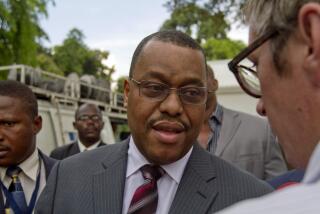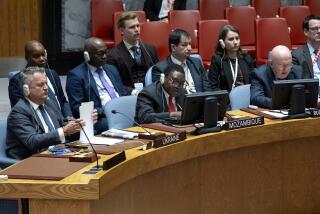Egyptian Leads Race for Top U.N. Post : Election: Butros Ghali wins an informal poll. But Washington’s choice is still not known.
- Share via
WASHINGTON — Egyptian Deputy Prime Minister Butros Butros Ghali, showing formidable support from many quarters, took the lead on Monday in the race for United Nations secretary general by winning the approval of 11 of the 15 members of the Security Council in an informal poll.
The issue was still clouded, however, by a host of factors: Members were allowed to vote in favor of as many candidates as they wished; vetoes were not taken into account, and the White House still has not made it clear who has the support of President Bush.
On secret straw ballots, the members were asked to mark next to the name of each of 14 candidates whether they would vote in favor, against or abstain. The council hopes to select a candidate this month so the General Assembly can confirm the selection in time for a transition before Javier Perez de Cuellar retires as secretary general at year’s end.
Butros Ghali, known for years as an articulate diplomat with many friends in the Western world, led all candidates with 11 favorable votes, one negative vote and three abstentions. Bernard Chidzero, the Zambian finance minister, was second with 10 favorable votes, two negative votes and three abstentions.
It was not known whether any of the negative votes were cast by the council’s five permanent members--the United States, the Soviet Union, China, Britain and France. In another informal poll set for today, the Big 5 will cast ballots of a different color than the rest of the Security Council, to show if any of them would veto Butros Ghali, Chidzero or the others in a formal vote.
Under U.N. rules, a negative vote in final balloting by any of the Big 5 defeats a candidate; otherwise, nine affirmative votes are needed to elect the secretary general.
For weeks, U.S. officials have dismissed the informal votes as “a charade,” insisting that the real campaign will not get under way until Bush makes clear his choice. “Everyone is waiting around to see what our selection is,” said a ranking State Department official, who predicted that it probably will be known this week.
But, if Butros Ghali, a Coptic Christian who has a Jewish wife and represents a Muslim country, shows commanding support, it is unlikely that the United States would provoke Egyptian President Hosni Mubarak, a staunch U.S. ally, by vetoing his candidate.
Butros Ghali has several advantages: He speaks French, satisfying a demand of France. He comes from the Third World, satisfying a demand of China. And he comes from Africa, satisfying a demand of the large African bloc.
But the Africans might accept him only with misgivings. They have insisted that it is an African’s turn to serve as secretary general. Since Egypt is a member of the Organization of African Unity, Butros Ghali is regarded officially as an African candidate. But most diplomats believe that most Africans want a black African in the post.
Aside from Butros Ghali and Chidzero, the only other candidates to get more positive than negative votes were: former Nigerian President Olusegun Obasanjo; Kenneth Dadzie of Ghana, the secretary general of the U.N. Conference on Trade and Development, and James Jonah of Sierra Leone, a U.N. undersecretary general.
Prime Minister Brian Mulroney recently had been regarded as a Bush favorite and a leading candidate, but he withdrew after it became clear that his candidacy would attract only lukewarm support from Africa and the rest of the Third World.
Times staff writer Doyle McManus contributed to this report.
More to Read
Sign up for Essential California
The most important California stories and recommendations in your inbox every morning.
You may occasionally receive promotional content from the Los Angeles Times.













